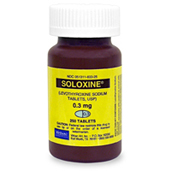The thyroid gland is part of a dog's
endocrine or hormonal system. The hormones that the gland produces
are essential for normal metabolism and growth. When a dog's
body produces lower than normal amounts of thyroid hormone, the disease
hypothyroidism is the result. Hyperthyroidism or the overproduction
of thyroid hormone is very rare in dogs.
"Hypothyroidism treatment is generally very effective and not too costly."
Hypothyroidism is most commonly diagnosed
in middle-aged or older, large breed dogs. The disease usually
develops after an abnormal immune reaction destroys the thyroid gland,
although other causes are possible. Hypothyroidism in puppies usually
occurs because of improper development of the thyroid gland.
The Signs of Hypothyroidism
Dogs that develop hypothyroidism as
adults typically have one or more of following symptoms:
- Lethargy
- Depression
- Weight gain
- Exercise intolerance
- Thin coat and poor hair growth
- Recurrent skin problems, including infections
- A preference for warm versus
cold parts of the home
In severe cases, hypothyroid dogs can
develop neurological problems or may even become comatose. Ruptured
cruciate ligaments and other musculoskeletal problems are also more
common in hypothyroid dogs. Puppies that have low thyroid hormone
levels have stunted growth.
Hypothyroidism Treatment Options

If you suspect that your dog has hypothyroidism,
take him to the veterinarian. He or she can take a sample of blood
and determine whether the amount of circulating thyroid hormone is normal
or low.
Evaluating the results of these blood tests can be complicated,
however, because thyroid hormone levels often decrease when a dog is
sick for any reason. Therefore, low thyroid hormone levels alone
should not automatically lead to a diagnosis of hypothyroidism.
To be accurately diagnosed with primary hypothyroidism, your dog should:
- have several of the common symptoms associated with hypothyroidism,
- have low levels of thyroid hormone, and
- the presence of other diseases
needs to been ruled out via blood work, a urinalysis, fecal examinations
and possibly other diagnostic tests.
If routine testing for hypothyroidism
is inconclusive, additional lab work that evaluates thyroid function
may be necessary.
Thankfully, hypothyroidism treatment
is much easier than its diagnosis. Several companies make an oral synthetic thyroid hormone, but the most consistent results are usually
seen with the brand name Soloxine. Treatment is generally very effective
and is not too costly, although most hypothyroid dogs do need to receive
their thyroid pills twice a day for the rest of their lives.
Routine
monitoring of a dog's thyroid hormone levels is also important to
make sure that his dose remains appropriate. Follow your veterinarian's
instructions regarding how to schedule these rechecks around the times
when you normally give your dog his pills. Taking a blood sample
at the wrong time makes interpreting the results very difficult.
The above is provided for information purposes only and should not be used for the diagnosis or treatment of any condition.
This information does not cover all possible variables, conditions, reactions, or risks relating to any topic, medication, or product and should not
be considered complete. Certain products or medications may have risks and you should always consult your local veterinarian concerning the treatment of
your pet. Any trademarks are the property of their respective owners.